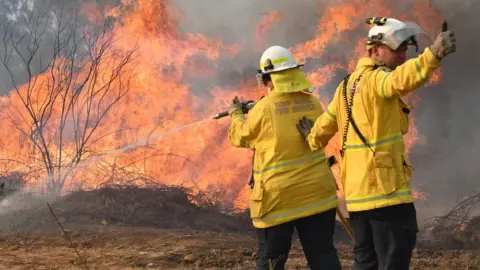Australia fires: Hundreds evacuated from coastal blaze
 EPA
EPAHundreds of people have been evacuated from their homes in eastern Australia as firefighters battle more than 130 blazes across two states.
Officials say the intense blazes mark the worst start to the fire season on record for the state of Queensland.
On Tuesday, 58 fires were also burning across about 100,000 hectares in neighbouring New South Wales.
About a dozen homes have been destroyed but officials have praised the "Herculean" efforts of firefighters.
More than 300 firefighters battled through the night on Monday to try and contain a major front on Queensland's Sunshine Coast.
It threatened homes in the residential area of Peregian Beach, and has so far destroyed one property.
"Last night's Herculean efforts [from firefighters] resulted in nothing short of a miracle," Queensland Acting Premier Jackie Trad said on Tuesday.
She and other political leaders have urged residents to follow evacuation orders. More than 400 people have been forced from their homes due to the coastal fire.
Allow X content?
Earlier in the week Ms Trad also noted the impact of climate change, including "increased temperatures", as having raised the fire risks for the subtropical state.
On the weekend, fires tore through rainforest areas in Queensland's south-east, which had dried out as a result of little rainfall this year.
Dry, hot conditions and winds of up to 80km/hr (50mph) also whipped up the fire at the coastal Peregian area, which was still threatening homes on Tuesday. Police said they were investigating whether the fire had been started deliberately.
Video shared online shows burning embers being blown into suburban streets, with locals describing the scenes as like "raining fire".
Traditionally, Queensland has not had a recognised bushfire season because fires were considered to occur there less frequently. In the drier southern states of New South Wales and Victoria, the season runs from October to April.
Officials have warned the hot and windy conditions are unprecedented this early in the season - and are the result of record winter warmth and little rainfall.
Many areas of south-east Australia have been enduring drought due to below-average rainfall over the past two years.